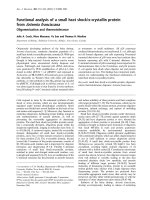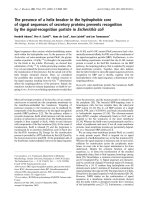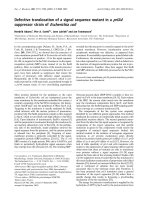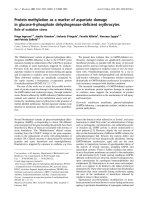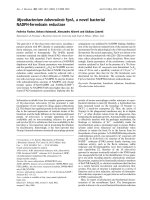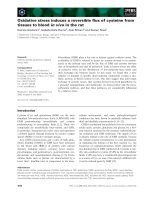Báo cáo y học: "CD40mAb adjuvant induces a rapid antibody response that may be beneficial in post-exposure prophylaxis" pptx
Bạn đang xem bản rút gọn của tài liệu. Xem và tải ngay bản đầy đủ của tài liệu tại đây (340.36 KB, 3 trang )
SHOR T REPOR T Open Access
CD40mAb adjuvant induces a rapid antibody
response that may be beneficial in post-exposure
prophylaxis
Vijay NS Bhagawati-Prasad
1†
, Evy De Leenheer
1†
, Nadine P Keefe
1
, Lorna A Ryan
1
, Jennifer Carlring
1
,
Andrew W Heath
1,2*
Abstract
Active vaccination can be effective as a post-exposure prophylaxis, but the rapidity of the immune response
induced, relative to the incubation time of the pathogen, is critical. We show here that CD40mAb conjugated to
antigen induces a more rapid specific antibody response than currently used immunological adjuvants, alum and
monophosphoryl lipid A™.
Findings
Post-exposure prophylaxis (PEP), or the induction of
protection against an infectious disease after exposure to
the pathogen, is either utilised or has been suggested as
an appropriate course o f action for a number of dis-
eases, including rabies [1], anthrax [2], varicella [3,4],
HIV a nd Hepatitis A [5]. PEP can be divided into three
categories: The administration of antibiotics or antivir-
als, passive immunization using specific immunoglobu-
lin, and active immunization (vaccination).
In some cases appropriate antimicrobial chemotherapy
may not be available, or there may be a worry that the
pathogen could be resistant to the agent, particularly in
bioterrorism cases. Passive immunization using immu-
noglobulin may be a suitable alternative, if the pathogen
is susceptible to antibody-mediated killing. However,
active vaccination has the potential advantages of lower
cost, less risk of adventitious pathogen transfer, and
most importantly the induction of long-term protection.
The use of active vaccination as PEP however depends
upon the rapidity with which a protective immune
response can be generated, in comparison with the incu-
bation period of the pathogen post-exposure. The
kinetics of the immune response are therefore a
potential rate-limiting step for the efficacy of post-expo-
sure vaccination.
Immune responses against vaccines are enhanced by
immunological adjuvants. Aluminum salts are the only
widely licensed immunological adjuvants [6], but the
adjuvant monophosphoryl lipid A (MPL™ )isnow
licensed in some co untries for use in the cervical cancer
vaccine, Cervarix™ [7] and may short ly be licensed for
use in a wider range of vaccines. Aside from MPL™ ,
thereisalargeamountofresearchongoingintoother
potential adjuvants, including host co-stimulatory mole-
cules [8], TLR agonists [6,9], other particulate carriers
[10,11] and combinations of these approaches [12,13].
Agonistic antibodies against the antigen presenting
cell surface antigen CD40 are able to mimic the effec t
of binding of the ligand, CD154, both in vitro [14] and
in vivo [15]. We h ave shown that agonistic CD40mono-
clonal antibody (mAb) is an effective immunological
adjuvant at low doses when chemically conjugated to
antigen. It is able to enhance antibody [16,17] as well as
T helper responses [18]. CD40 antibody or ligand is also
being investigated in cancer therapy and vaccination
[19,20]. As we believe CD40mAb c onjugate acts as an
adjuvant at least in part via a direct effect on B cells
[21], we were interested in assessing the rapidity of the
antibody response induced by CD40mAb in compari son
with other adjuvants. We used the model antigen, oval-
bumin, in order to compare the kinetics of the induced
* Correspondence:
† Contributed equally
1
Department of Infection and Immunity, University of Sheffield Medical
School, Beech Hill Rd, Sheffield S10 2RX, UK
Bhagawati-Prasad et al. Journal of Immune Based Therapies and Vaccines 2010, 8:1
/>© 2010 Bhagawati-Prasad et al; licensee BioMed Central Ltd. This is an Open Access article distributed under the terms of the Creative
Commons Attribution License ( which permits unrestricted use, distribution, and
reproduction in any medium, provided the original work is properly cited.
antibody response between CD40 c onjugate, MPL™ and
the widely used alum adjuvant.
Female C57Bl/6 m ice aged 6-8 weeks were obtained
from Harlan UK Ltd and housed in accordance with
strict Home Offi ce guidelines. Ovalbumin (Sigma) was
conjugated to the CD40mAb 10C8 [22] as previously
described [16]. Four groups of 15 mice were immunised
intraperitoneally with either 10 μg of conjugate, 10 μgof
ovalbumin either alone, with MPL™ (10 μg, Sigma) or
adsorbed onto Aluminium hydroxide (200 μg, 5). Five of
the15micewerebledevery3daysinrotation,and
anti-ovalbumin IgG endpo int titers deter mined by
ELISA assay as previously described [16]
ELISA results a re shown in Fig 1. CD40mAb conju-
gate induced an IgG response against OVA by day 7
post immunization, whereas no IgG response to OVA
+MPL™ or OVA+alum was seen until day 8, and in the
case of alum this was weak. The results shown are
representative of a total of three experiments. Total
immunoglobulin responses (including IgM) tended to
Figure 1 C57Bl/6 mice were immunized once, as described in the text, with ovalbumin and the adjuvant shown at the top of the
figure, and bled at various days post-immunization (shown on left side of figure). ELISA data are plotted for 5 mice in each case with the
reciprocal of the serum dilution on the x axis, and optical density at 490 nm on the y axis. Note the scale of the y axis varies by row. Response
to CD40mAb adjuvanted vaccine was significantly better than the response to MPL or alum at day 7 (p < 0.05, One-way ANOVA with Dunnet’s
post-test).
Bhagawati-Prasad et al. Journal of Immune Based Therapies and Vaccines 2010, 8:1
/>Page 2 of 3
arise a day earlier, but showed the same difference in
kinetics between CD40 and the other two adjuvants.
CD40mAb-OVA conjugate induces a more rapid IgG
response in mice than either the established adjuvant,
alum, or the newer adjuvant, MPL™. How much faster
the response to a CD40mAb vaccine versus an MPL
adjuvanted vaccine would be in humans w ould need to
be determine d empirically. How important a more ra pid
response would be w ould depend upon the titers
required to protect against a particular pathogen, as well
as the window of opportunity available to prevent dis-
ease. We propose that CD40mAb conjugates may have
utility in post-exposure prophylaxis when a rapid anti-
body response is desirable.
Abbreviations used
MPL: monophosphoryl lipid A; TLR: Toll like receptor;
ELISA: Enzyme linked immunosorbent assay; PEP: post-
exposure prophylaxis; mAb: monoclonal antibody.
Author details
1
Department of Infection and Immunity, University of Sheffield Medical
School, Beech Hill Rd, Sheffield S10 2RX, UK.
2
Adjuvantix Ltd, c/o Fusion plc,
Sheffield Bioincubator, Leavygreave Rd, Sheffield, UK.
Authors’ contributions
VB, ED, NK and LR performed the experimental work. Experiments were
designed by JC, ED and AH. AH, ED and JC wrote the manuscript.
All authors have read and approved the final manuscript.
Competing interests
AH is a Director of Adjuvantix Ltd and also holds some stock in Adjuvantix.
Adjuvantix Ltd have an interest in CD40mAb based immunological
adjuvants.
Received: 21 December 2009
Accepted: 4 February 2010 Published: 4 February 2010
References
1. Ertl HC: Novel vaccines to human rabies. PLoS Negl Trop Dis 2009, 3:e515.
2. Inglesby TV, O’Toole T, Henderson DA, Bartlett JG, Ascher MS, Eitzen E,
Friedlander AM, Gerberding J, Hauer J, Hughes J, McDade J, Osterholm MT,
Parker G, Perl TM, Russell PK, Tonat K: Anthrax as a biological weapon,
2002: updated recommendations for management. JAMA 2002,
287:2236-2252.
3. Watson B, Seward J, Yang A, Witte P, Lutz J, Chan C, Orlin S, Levenson R:
Postexposure effectiveness of varicella vaccine. Pediatrics 2000, 105:84-88.
4. Salzman MB, Garcia C: Postexposure varicella vaccination in siblings of
children with active varicella. Pediatr Infect Dis J 1998, 17:256-257.
5. Kohl I, Nemecek V, Summerová M, Chlíbek R, Nad’ová K, Mináriková O:
Long-term protective effect of post-exposure Havrix administration
during viral hepatitis Type A outbreaks. Eur J Epidemiol 2006, 21:893-899.
6. Tagliabue A, Rappuoli R: Vaccine adjuvants: the dream becomes real.
Hum Vaccin 2008, 4:347-349.
7. Paavonen J, Naud P, Salmeron J, Wheeler CM, Chow SN, Apter D,
Kitchener H, Castellsague X, Teixeira JC, Skinner SR, Hedrick J, Jaisamrarn U,
Limson G, Garland S, Szarewski A, Romanowski B, Aoki FY, Schwarz TF,
Poppe WA, Bosch FX, Jenkins D, Hardt K, Zahaf T, Descamps D, Struyf F,
Lehtinen M, Dubin G, Greenacre M: Efficacy of human papillomavirus
(HPV)-16/18 AS04-adjuvanted vaccine against cervical infection and
precancer caused by oncogenic HPV types (PATRICIA): final analysis of a
double-blind, randomised study in young women. Lancet 2009,
374:301-314.
8. Barr TA, Carlring J, Heath AW: Co-stimulatory agonists as immunological
adjuvants. Vaccine 2006, 24:3399-3407.
9. De Gregorio E, D’Oro U, Wack A: Immunology of TLR-independent
vaccine adjuvants. Curr Opin Immunol 2009, 21:339-345.
10. Mesa C, de Leon J, Fernandez LE: Very small size proteoliposomes derived
from Neisseria meningitidis: An effective adjuvant for generation of CTL
responses to peptide and protein antigens. Vaccine 2006, 24:2692-2699.
11. Singh M, Chakrapani A, O’Hagan D: Nanoparticles and microparticles as
vaccine-delivery systems. Expert Rev Vaccines 2007, 6:797-808.
12. Hatzifoti C, Bacon A, Marriott H, Laing P, Heath AW: Liposomal co-
entrapment of CD40mAb induces enhanced IgG responses against
bacterial polysaccharide and protein. PLoS ONE 2008, 3:e2368.
13. Ahonen CL, Doxsee CL, McGurran SM, Riter TR, Wade WF, Barth RJ,
Vasilakos JP, Noelle RJ, Kedl RM: Combined TLR and CD40 triggering
induces potent CD8+ T cell expansion with variable dependence on
type I IFN. J Exp Med 2004,
199:775-784.
14. Heath AW, Chang R, Harada N, Santos-Argumedo L, Gordon J, Hannum C,
Campbell D, Shanafelt AB, Clark EA, Torres R, et al: Antibodies to murine
CD40 stimulate normal B lymphocytes but inhibit proliferation of B
lymphoma cells. Cell Immunol 1993, 152:468-480.
15. Dullforce P, Sutton DC, Heath AW: Enhancement of T cell-independent
immune responses in vivo by CD40 antibodies. Nat Med 1998, 4:88-91.
16. Barr TA, McCormick AL, Carlring J, Heath AW: A potent adjuvant effect of
CD40 antibody attached to antigen. Immunology 2003, 109:87-92.
17. Hatzifoti C, Heath AW: CD40-mediated enhancement of immune
responses against three forms of influenza vaccine. Immunology 2007,
122:98-106.
18. Carlring J, Barr TA, McCormick AL, Heath AW: CD40 antibody as an
adjuvant induces enhanced T cell responses. Vaccine 2004, 22:3323-3328.
19. Tang Y, Akbulut H, Maynard J, Petersen L, Fang X, Zhang WW, Xia X,
Koziol J, Linton PJ, Deisseroth A: Vector prime/protein boost vaccine that
overcomes defects acquired during aging and cancer. J Immunol 2006,
177:5697-5707.
20. Vonderheide RH: Prospect of targeting the CD40 pathway for cancer
therapy. Clin Cancer Res 2007, 13:1083-1088.
21. Barr TA, Carlring J, Heath AW: CD40 antibody as a potent immunological
adjuvant: CD40 antibody provides the CD40 signal to B cells, but does
not substitute for T cell help in responses to TD antigens. Vaccine 2005,
23:3477-3482.
22. Barr TA, Heath AW: Functional activity of CD40 antibodies correlates to
the position of binding relative to CD154. Immunology 2001, 102:39-43.
doi:10.1186/1476-8518-8-1
Cite this article as: Bhagawati-Prasad et al.: CD40mAb adjuvant induces
a rapid antibody response that may be beneficial in post-exposure
prophylaxis. Journal of Immune Based Therapies and Vaccines 2010 8:1.
Submit your next manuscript to BioMed Central
and take full advantage of:
• Convenient online submission
• Thorough peer review
• No space constraints or color figure charges
• Immediate publication on acceptance
• Inclusion in PubMed, CAS, Scopus and Google Scholar
• Research which is freely available for redistribution
Submit your manuscript at
www.biomedcentral.com/submit
Bhagawati-Prasad et al. Journal of Immune Based Therapies and Vaccines 2010, 8:1
/>Page 3 of 3



